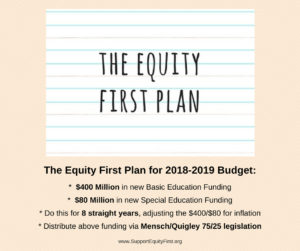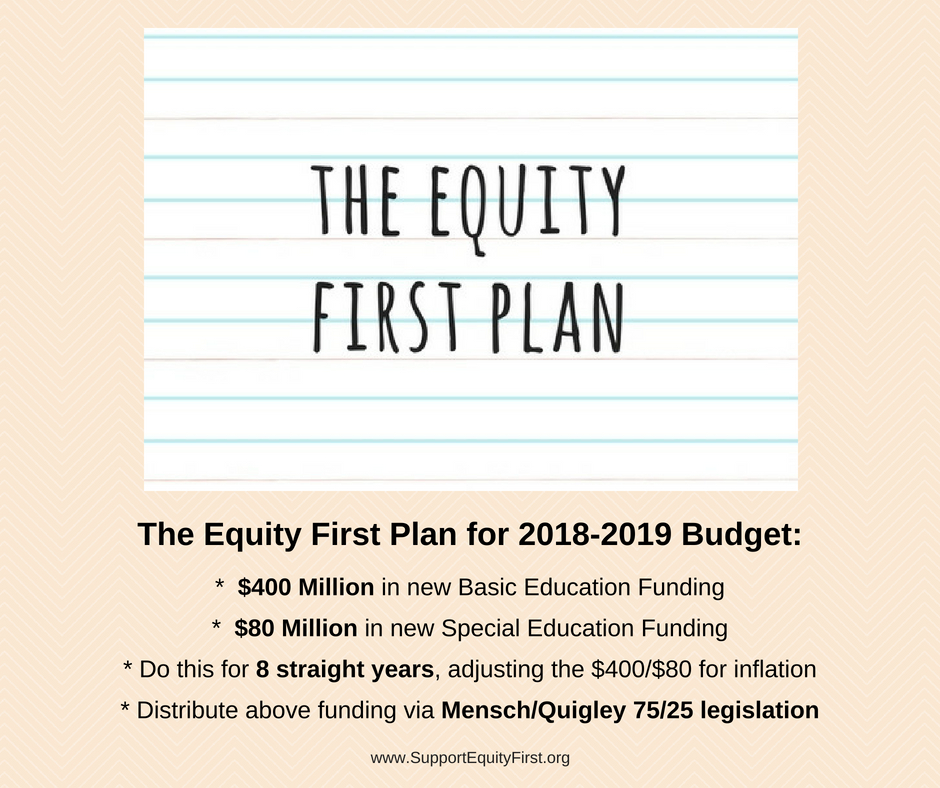For Immediate Release: 20 Years of Basic Education Funding in Pennsylvania
Citizens for Fair & Equitable School Funding
Media Contact:
Shelly@SupportEquityFirst.org
@EquityFirstOrg
FOR IMMEDIATE RELEASE
June 14, 2018
Twenty Years of Basic Education Funding in Pennsylvania
Looking at Governors in Four Year Terms (adjusted for inflation)
$1.15 Billion – Rendell – 2nd Term of 4-year term
$ 908.52 Million – Rendell – 1st Term of 4-year term
$ 745.82 Million – Ridge/Schweiker – 2nd Term of 4-year term
$ 575.50 Million – Corbett 4-year term
$ 564.25 Million – Wolf 1st Term of 4-year term
(Harrisburg, PA) – June 14, 2018 – Even though the national recession started in December 2007, the last four-year term of Governor Edward G. Rendell was the high-water mark for budget increases in Basic Education funding in Pennsylvania. During Governor Rendell’s last four-year term, the Governor and Pennsylvania General Assembly invested an additional $1.15 Billion in basic education funding, adjusting for inflation. Basic Education is the largest single budget allocation in the state budget. Rendell’s first four-year term was the second highest increase in Basic Education funding, followed by the second term of Governor Tom Ridge and Governor Mark Schweiker at $745.82 Million. Under Governor Tom Corbett Basic Education funding was increased by $575.5 Million and under Governor Tom Wolf Basic Education funding will increase by $564.25 Million if his proposed increase of $100 Million in Basic Education becomes law with adoption of the 2018-2019 state budget. All figures adjust for inflation to December 31, 2017.
Governor Rendell also had the three biggest annual increases in Basic Education. In the 2006-2007 budget, Governor Rendell and the General Assembly increased Basic Education funding by $292 Million, a 7.25% increase, which adjusted for inflation through December 31, 2017 was $367.31 Million. In the 2009-2010 budget, Governor Rendell and the General Assembly increased Basic Education funding by $299.9 Million, a 6.29% increase, which adjusted for inflation was $342.53 Million. Likewise, in the 2008-2009 budget Basic Education funding increased by $274.7 Million, a 6.15% increase, which adjusted for inflation was 325.64 Million.
The smallest annual increase in Basic Education occurred in the 2012-2013 state budget when Governor Tom Corbett and the General Assembly increased Basic Education funding by $49 Million, a 0.92% increase, which adjusted for inflation was $53 Million. Next smallest, in the 2018-2019 budget, Governor Wolf has proposed a $100 Million increase in Basic Education funding, a 1.64% increase. In the 2017-2018 Governor Wolf and the General Assembly increased Basic Education funding by $100 Million, which adjusted for inflation in $102.1 Million, a 1.67% increase.
Defining adequacy and other impacts:
Commonwealth of Pennsylvania State Board of Education
Summary of Costing-Out Study
In July 2006, the General Assembly called for an independent statewide Costing-Out Study to determine the resources needed to help all students achieve the state’s academic standards. Act 114 of 2006 required the study to address two issues – adequacy and equity. The study of adequacy was to determine what it costs for all our students – no matter where they live – to attain state academic standards. The study of equity was to address the growing gap between high- and low-spending districts and the implications for the quality of education received by students and for local taxpayers. That study, completed in December 2007, concluded that Pennsylvania was under-funding K-12 education by more than $4 Billion and that the system then in place relied too heavily on local property taxes.
The study determined that 94 percent of Pennsylvania districts had inadequate resources to meet the learning needs of all their students and that 92 percent of the state’s students attended school in those districts. This is not an isolated problem. The study also found that due to heavy reliance on local property taxes, districts with the lowest wealth were forced to levy higher tax rates than wealthier districts but still could not raise enough revenue to finance an adequate education for all their students. Source: http://www.paschoolfunding.org/get-the-facts/pa-costing-out-study/
Basic and Special Education Funding Commission Reports
Act 126 of 2014 established the Special Education Funding formula (“SEF formula”) and Act 35 of 2016 established the Basic Education Funding formula (“BEF formula”). This year, Governor Wolf proposed an increase for Special Education funding by $20 Million and Basic Education by $100 Million both to be distributed through the adopted funding formula laws to all 500 school districts.
Demonstrating Inequity
Distributing all Basic and Special Education funding through the adopted funding formulas shows 362 school districts receiving their baseline amount under the formula laws, while 138 districts are not receiving their baseline amount under the formula laws. Presently, 19 school districts receive $10 million less than their baseline amount, totaling $931.6 Million, while 9 school districts receive $10 Million more than their baseline amount, totaling $182.5 Million.
Currently, $107,525,000 in special education funding and $538,700,000 in basic education funding are distributed through the new SEF and BEF formula laws. To bring all 138 districts to their baseline amount requires $1.22 Billion.
Hold Harmless
Since the 1992-1993 state budget, Pennsylvania has followed an unwritten policy called “hold harmless”, where no school district gets less Basic Education and Special Education funding than it received in the prior year’s budget. Because of this unwritten Hold Harmless policy, it appears the Governor and General Assembly will not reduce a school district’s Basic and Special Education funding regardless of what the Basic Education Funding formula and Special Education funding formula say the district should receive, or if that district lost significant enrollment, experienced reductions in household income or property values, or increases in poverty rates.
The Definition of Equity
Accordingly, as a direct result of hold harmless policy where no district can lose Basic and Special Education funding, to attain “equity” between all 500 districts in this state budget, a budget allocation of $3.21 Billion would bring every school district to the baseline funding level of school district receiving the most funding through the Basic and Special Education formula laws.
Inflation
Just to keep pace with last year’s inflation of 2.1%, Basic Education funding of $5.995 Billion would need to be increased by $125,896,659. However, Governor Wolf has proposed an increase of $100 Million for Basic Education, a 1.64% increase, which does not keep pace with inflation. At a minimum, the 2018-2019 state budget should keep pace with inflation. If the Governor and General Assembly were to match the high-water increase of 7.25% that Governor Rendell and the General Assembly adopted in 2006-2007, next year’s budget would be $434,937,165.
The Senator Mensch/Representative Quigley Legislation
Since the adoption of the Basic and Special Education funding formula laws, the Governor and General Assembly have increased funding for Basic Education by $538,700,00 and Special Education by $107,525,000, increases of 8.99% and 9.58%, respectively and distributed these new funds to all 500 school districts, even districts already receiving their baseline amount. Thus, the mathematical challenge is this: by distributing all new Basic and Special Education funding to all 500 school districts through the new formula laws, the 362 districts already receiving their baseline, continue to get more funding, thus, significantly delaying the date when all 500 districts would get their baseline funding. In fact, the Equity First coalition was formed specifically to address this major problem.
Senator Bob Mensch and Representatives Tom Quigley are introducing legislation that would establish the Basic and Special Education Funding Equity Fund.
The legislation incorporates several recommendations from the Basic Education Funding Commission and affirms the funding formulas. To speed funding to school districts not receiving their baseline funding the legislation allocates 75% of all new Basic Education funding proportionately to underfunded school districts only; and the remaining 25% of all new Basic Education funding to all 500 school districts through the Act 35 Basic Education Formula. Likewise, this Senate Bill incorporates several recommendations and observations from the Special Education Funding Commission and allocates 75% of all new Special Education funding proportionately to underfunded school districts only; and the remaining 25% of all new Special Education funding to all 500 school districts through the Act 126 Special Education Formula.
Under the legislation every school district will receive an increase in Basic and Special Education Funding, while a larger proportion of funding will rightly go to the school districts not receiving their baseline amount through the formula laws.
Equity First
Established in 2016 to advocate adoption and full-funding of the Basic Education Funding Commission Report, the goal of Equity First is to see Pennsylvania distribute 100% of Basic and Special Education funding through their adopted formulas law. The obstacles are the unwritten hold harmless policy and the fact that the majority of state representatives and senators represent districts receiving more than their baseline funding amounts.
To jumpstart equity for the 2018-2019 state budget, Equity First supports a $400 Million increase in Basic Education funding, an increase of 6.67% and $80 Million increase for Special Education, with funds distributed the Senator Mensch 75/25 legislation. Further, Equity First supports a $400 Million increase for Basic Education and $80 Million for Special Education, adjusted for inflation for the next eight (8) years, with funds distributed via the Senator Mensch 75/25 legislation.
For more information contact Equity First at Shelly@SupportEquityFirst.org or visit, www.SupportEquityFirst.org
A former state representative, Kelly Lewis is a co-founder of the Citizens for Fair and Equitable School Funding and its school funding coalition, Equity First. A lawyer, Lewis has an MBA in Finance. Intern Matt Peters, a student at Harrisburg Area Community College contributed research to this article.


